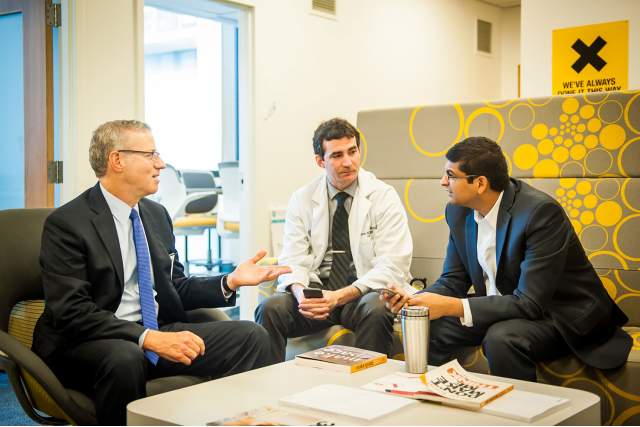by Kirk Kardashian
May 14, 2019
For the past 25 years, Dr. Catherine Florio Pipas has been promoting health and wellness at Dartmouth and teaches on this topic at the College and at Geisel School of Medicine at Dartmouth.
The broad concept of the course is that by caring for ourselves we are better able to care for others. Last fall, Pipas put her course curriculum into book form in A Doctor’s Dozen: Twelve Strategies for Personal Health and a Culture of Wellness (Dartmouth College Press), a practical guide whose audience stretches far beyond health care workers. In fact, when the student fellows at the Center for Health Care heard about the book, they thought it would have particular applicability to MBA students, who themselves are often challenged by stress and anxiety. So they partnered with Pipas to bring a 12-session wellness series to Tuck this winter and spring, covering one chapter of her book each week.
The topic resonated strongly with Sarah Igoe T’19, a fellow at the Center for Health Care. “I came to Tuck largely because I was burnt out from a previous career in medicine,” she says. Igoe has a medical degree and was on the path to being a practicing physician. She opted out during her residency, exhausted from working 30-hour shifts. But instead of assuming personal health would have the same relevance for other Tuck students, Igoe and her colleague Teja Kadire T’19 created a survey on wellness to gauge the needs of the community. The survey had a mix of standard questions about burnout, such as perceived stress, quality of life, and mindfulness, and a few specific questions about wellness in the context of Tuck. The results of the survey showed that the Tuck community could benefit from a wellness series, and that there was genuine interest from students and staff.
I was very struck when people said that by taking time to think about wellness, they realized they had more time, and that some of these small things can make a huge difference in being able to sustain their health.
National surveys indicate that many people can benefit from wellness education. According to a 2018 Gallup poll of 7,500 full-time employees, 23 percent reported feeling burned out at work very often or always, while an additional 44 percent reported feeling burned out sometimes. Burnout rates for health care workers and executives are even higher. According to Pipas, the hallmarks of burnout are three-fold: the loss of accomplishment or sense of purpose, depersonalization (when you stop caring about people, including yourself), and physical and emotional exhaustion. “What encompasses all three is when people say, ‘I just don’t care,’” Pipas explains. She has seen it in person many times during her career: patients who feel pressure to be superhuman at work, denying their hunger, thirst, sadness and joy. “If we’re trying to do everything perfectly and trying to do everything all the time, we lose sight of our own health and wellness and eventually it will catch up to us,” Pipas says.
Pipas’s book addresses wellness through case studies, scientific evidence, and specific strategies. Chapters focus on areas such as self-reflection, building resilience, healthy eating and exercise, emotional intelligence, and time management, just to name a few. Each session of the wellness series began with checking-in on what was going well for participants, and what they were struggling with. Then they discussed the case from that week’s chapter and talked about how the strategies from that story could be applied in their own lives and at Tuck. “I was very struck when people said that by taking time to think about wellness, they realized they had more time, and that some of these small things can make a huge difference in being able to sustain their health,” Pipas says.

